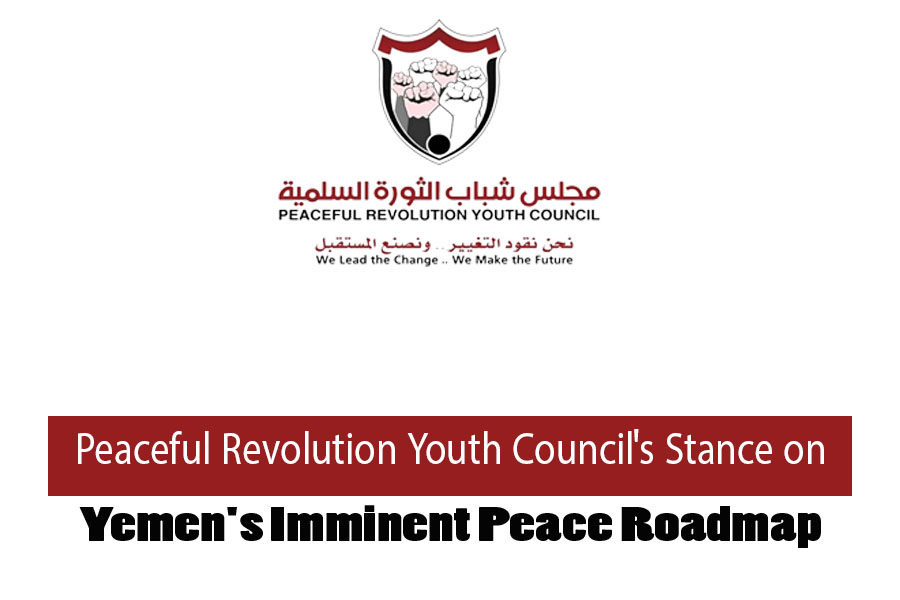It goes without saying that the current stance of the Peaceful Revolution Youth Council, which disapproves of the Saudi-Houthi understandings, aligns with its consistent position.
The Council has previously characterized such understandings as dubious agreements that prioritize the shared Saudi-Houthi agendas, neglecting the will and interests of the Yemeni people and disregarding even the core components of Yemen's national political landscape.
With reference to the official announcement made by United Nations envoy to Yemen, Hans Grundberg, concerning the introduction of a political settlement roadmap, it is imperative to carefully consider a number of significant aspects. As outlined by Mr. Grundberg, this roadmap incorporates novel provisions that confer heightened legitimacy, political influence, and increased economic and military empowerment upon the Al-Houthi faction. By implementing these provisions, the Al-Houthi group effectively assumes an indisputable and authorized position, imposing their control over the Yemeni people. Given the gravity of this situation, it is essential to emphasize the following matters:
Firstly, the Council deems the forthcoming agreement, set to be announced in the coming weeks, as detrimental to Yemeni interests due to its perpetuation of divisions and granting legitimacy to various militias, ultimately contributing to further fragmentation of the country. It asserts that this situation could have been averted if political forces and parties had not complied with the logic of Saudi, Emirati, and Iranian guardianship over the will of the Yemeni people. Within this context, the Council identifies the confiscation of Yemeni decision-making and the exclusion of national components and activities by these nations as a blatant transgression against Yemen's sovereignty. Moreover, it perceives the intervention of Saudi Arabia, the United Arab Emirates, and Iran not solely as guardianship, but rather as a conspicuous and unambiguous occupation. Consequently, it resolutely urges the prompt termination of such intervention and actively supports resistance against it.
Secondly, the Council emphatically asserts that the Houthi militia functions as a tool for the Iranian occupation, engaging in activities that directly contradict the fundamental interests of the Yemeni people and their legitimate aspirations to establish a state characterized by principles of citizenship and equal rights. The Council emphasizes that the actions of the Houthi militia actively contribute to the erosion of Yemen's national identity, imposing its sectarian ideology and severely undermining the social fabric of Yemeni society in an unparalleled manner. It is crucial to remember the catastrophic consequences brought about by the Houthi project, which have resulted in an immense loss of lives, widespread displacement, rampant famine, the destruction of crucial institutions, and a looming threat of state disintegration. Hence, the Council expresses its profound astonishment at the persistent insistence on transferring control of Yemen to a faction that fundamentally rejects the principles of political engagement, citizenship, and the rule of law, while pursuing policies of internal occupation rooted in domination, myth-making, and deliberate impoverishment of the population.
Thirdly, the Council underscores with utmost gravity that the heinous act of the coup, which led to the destruction of the Yemeni state, the plundering of its resources, the commission of war crimes, and the flagrant violations of human rights, is not bound by any statute of limitations. The Council unequivocally affirms that neither Yemeni nor regional nor international entities hold the power to deprive Yemenis of their inherent right to pursue justice and demand legal accountability for all individuals implicated in these abhorrent crimes, as stipulated by the principles of the law.
Fourthly, the Council firmly aligns itself with any national political entity that rejects external wills and their affiliated militias in all their variations, while urging the Yemeni people to steadfastly uphold their entitlement to reclaim their usurped republic, safeguard their rights to citizenship, peace, and adherence to the rule of law, and firmly reject interim solutions that lend support to the coup factions operating in both the northern and southern regions. The Council stresses the utmost importance for regional and international actors to demonstrate due respect for the will of Yemen and its foundational pillars, notably the Yemeni constitution, the outcomes of the national dialogue, and UN Resolution 2216, which collectively serve as indispensable frameworks for charting the future course of the nation.
Fifthly, the Council's resolute opposition to this questionable agreement is rooted in its steadfast dedication to the pursuit of genuine peace. The current proposition being put forth masquerades as a peace initiative, but in reality, it serves as a platform for the militias, regardless of their affiliations, to consolidate their power and amass wealth, all while laying the groundwork for a potentially more devastating and widespread cycle of violence. The proposed contents of this agreement strongly indicate that its primary objective is to offer a safe exit strategy for the countries that have interfered with the destiny of our nation during the past eight years, while leaving the country in the clutches of these militias, effectively holding it hostage to their whims and desires.
Sixthly, it is imperative to note that any viable peace roadmap must encompass tangible international guarantees that ensure the disarmament of local militias, prevent regional interference in Yemen's internal affairs, and initiate a comprehensive reconstruction endeavor that aids Yemenis in rebuilding what has been ravaged by the war. Furthermore, these guarantees must also prioritize the preservation of the nation's identity and its republican political system. The notion of maintaining the unity of Yemen's national territory without such guarantees would merely sow the seeds of further chaos and strife, a reality that must be acknowledged by individuals yearning for freedom across all regions. This awareness serves as a crucial foundation for the eventual overthrow of this flawed roadmap and the establishment of a nation that aligns with the aspirations and enduring principles of independence, unity, republicanism, citizenship, and the rule of law.
In remembrance of Yemen's martyrs,
May mercy abound and wounds find healing,
May federal Yemen shine with glory
Released on December 26, 2023

